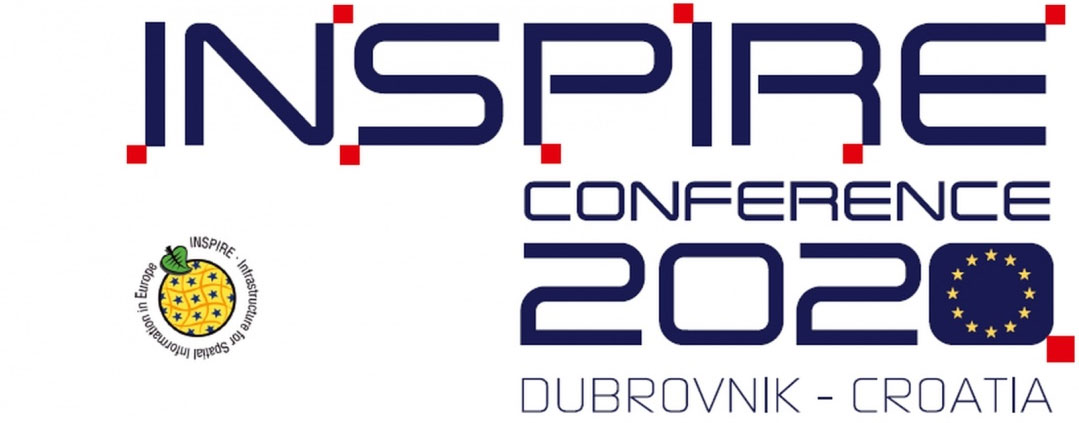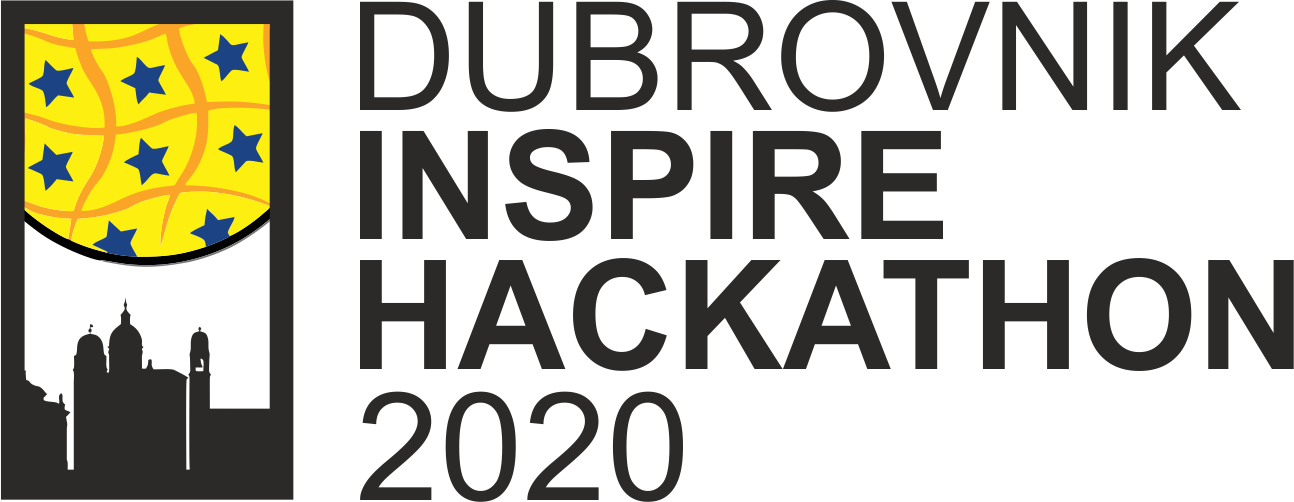2020 is the fourth year of the INSPIRE Hackathon organised in the frame of the INSPIRE Conference (Dubrovnik, 12-15 May 2020).
The INSPIRE Hackathon 2020 is in line with the motto of the INSPIRE Conference – “Bringing sustainability and digitalisation together”. The goal of the hackathon is to promote collaboration and sharing of experience in the domain of spatial data/services and citizen-science while showcasing their utilisation and uptake to different application domains and themes. This includes supporting the Sustainable Development Goals.
of spatial data/services and citizen-science while showcasing their utilisation and uptake to different application domains and themes. This includes supporting the Sustainable Development Goals.
THEMES AND DOMAINS
The themes of the INSPIRE Hackathon 2020 include:
- Artificial Intelligence solutions with integrated use of citizen science data
- Demonstrating interoperability between citizen-science tools and datasets while leveraging innovative protocols, standards and frameworks
- Facilitating integration between citizen-science and existing infrastructures/systems for environmental monitoring
- Artificial Intelligence and citizen science applied for the agricultural sector (EO4AGRI)
- Showcasing integration between INSPIRE, GEOSS, COPERNICUS and citizen-science data, focusing on standardisation, web APIs and novel processing frameworks (i.e. machine learning), towards the creation of added value applications.
The target domains include:
- Environmental monitoring and policymaking
- Agriculture and sustainable bioeconomy
- Disaster resilience
- Transport applications for policy making
- Planning
- Environmental protection
- Internet of Things
- Weather
- Biodiversity
PARTICIPATION & REGISTRATION
The first phase of the INSPIRE Hackathon 2020 starts before the INSPIRE Conference in Dubrovnik. Several challenges and their mentors are defined and anyone can join the challenge (see below). Virtual meeting, webinars and other virtual means of communication will be used to advance the defined challenges. The mentor of each challenge will be responsible for communicating with the team members that join this challenge.
For participation in this virtual stage (from now on until 11 May 2020), please register at: https://docs.google.com/forms/d/e/1FAIpQLSdfA0xmnkfSf4L3qGIj1bwYo-DfWPLAZzrpYMJBwuuNO3kPVQ/viewform
All the teams that participate in the remote phase of the hackathon will be invited to present their project results during the dedicated workshop at the INSPIRE Conference. This workshop will take place in Dubrovnik 14 May 2020 at 2pm CEST. For this reason, teams will be asked to prepare a presentation showing their hackathon project results. This part of the hackathon is not mandatory for the team members. However, you are invited to join this workshop. In this case, please do not forget to register for the INSPIRE Conference 2020.
CHALLENGES
- Using Sentinel 1 data and IoT technology for analysis of soil moisture
- Using AI intelligence for detection of Land Use objects
- Deep learning for weather forecast
- Traffic Modelling upon OpenStreetMap – use case of Františkovy Lázně.
- Extend OpenLandUse by selected Inspire Data Theme
- Integration between citizen-science and EO authentication systems
- Establish the connection of Citizen Observatories resources with central catalogue
- Improve interoperability between methods for sharing in-situ and citizen-sourced data
- EO4Agri Ideathlon
- Remote sensing derived vegetation phenological indices (crop emergence, harvest, etc ..) based on Copernicus data
- Copernicus and LPIS data combined in data cube services
EVALUATION
Each team will be evaluated by the jury based on the following criteria:
- Combination of Remote sensing, INSPIRE and Citizen Science data or services
- The utilisation of AI tools
- Readiness level
- Innovation
- Sustainability of solution
- Contribution to the Sustainable Development Goals
- Cross sectoral interoperability
- Cross boundary interoperability
CAPACITY BUILDING
An important component of the INSPIRE hackathon concept is the capacity building activities. It is provided in webinars organized by each of the challenges. In addition to a short introduction to the INSPIRE hackathon concept and the specific challenge, experts are invited to speak about topics covered within the challenge. This way transfer of knowledge (often across disciplines) go side by side with efficient management of the challenge work. The webinars will be announced within a couple of weeks after the hackathon is kicked-off.
TIMELINE
- March 2020 – start of the hackathon, registration opens
- Between 23rd March – 3. April 2020 a series of webinars introducing the teams and their progress. There are educational elements in these webinars.
- 11th May 2020 – preparing presentations for the workshop in Dubrovnik
- 14th May 2020 – presentation of the hackathon results at the workshop in Dubrovnik
The INSPIRE Hackathon 2020 is supported by the following organisations and projects:
Plan4all (https://www.plan4all.eu/) – Plan4all is a non-profit association sustaining and further enhancing the results of multiple research and innovation projects. It aggregates large open datasets related to planning activities in different specialisms areas transport, spatial and city planning, environment and tourism. Plan4all makes sure that open data are easily accessible for reuse, data are maintained and their quality is improved.
WeObserve (https://www.weobserve.eu/) – Rising trends in Citizen Science have led to the development of Citizen Observatories (COs) focused on engaging citizens in environmental monitoring across Europe. WeObserve is an H2020 Coordination and Support Action, which tackles three key challenges that Citizens Observatories (COs) face: awareness, acceptability and sustainability. The project aims to improve the coordination between existing COs and related regional, European and international activities. The WeObserve mission is to create a sustainable ecosystem of COs that can systematically address these identified challenges and help to move citizen science into the mainstream. The specific WeObserve objectives can be summarised as follows: i) Develop communities of practice around key topics to assess the current CO knowledge base and strengthen it to tackle future environmental challenges using CO-driven science ii) Extend the geographical coverage of the CO knowledge base to new communities and support the implementation of best practices and standards across multiple sectors iii) Demonstrate the added value of COs in environmental monitoring mechanisms within regional and global initiatives such as GEOSS, Copernicus and the UN Sustainable Development Goals iv) Promote the uptake of information from CO-powered activities across various sectors and foster new opportunities and innovation in the business of in-situ earth observation
NextGEOSS (http://nextgeoss.eu/) – The NextGEOSS project, a European contribution to GEOSS (Global Earth Observation System of Systems), is developing the next generation centralised European data hub and cloud platform for Earth Observation data, where the users can connect to access data and deploy Earth observation based applications. The concept revolves around providing the data and resources to the user communities, together with cloud resources, seamlessly connected to provide an integrated ecosystem for supporting applications. A central component of NextGEOSS is the strong emphasis put on engaging the communities of providers and users, and bridging the space in between.
EO4Agri (http://eo4agri.eu/) – The main objective of EO4AGRI is to catalyze the evolution of the European capacity for improving operational agriculture monitoring from local to global levels based on information derived from Copernicus satellite observation data and through exploitation of associated geospatial and socio-economic information services. EO4AGRI assists the implementation of the EU Common Agricultural Policy (CAP) with special attention to the CAP2020 reform, to requirements of Paying Agencies, and for the Integrated Administration and Control System (IACS) processes. EO4AGRI works with farmers, farmer associations and agro-food industry on specifications of data-driven farming services with focus on increasing the utilization of EC investments into Copernicus Data and Information Services (DIAS). EO4AGRI addresses global food security challenges coordinated within the G20 Global Agricultural Monitoring initiative (GEOGLAM) capitalizing on Copernicus Open Data as input to the Famine Early Warning System Network (FEW-NET). EO4AGRI assesses information about land-use and agricultural service needs and offers to financial investors and insurances and the potential added value of fueling those services with Copernicus information. The EO4AGRI team consists of 11 organizations, complementary in their roles and expertise, covering a good part of the value-chain with a significant relevant networking capital as documented in numerous project affiliations and the formal support declarations collected for EO4AGRI. All partners show large records of activities either in Copernicus RTD, governmental functions, or downstream service operations. The Coordinator of EO4AGRI is a major industrial player with proven capacities to lead H2020 projects. The EO4AGRI project methodology is a combination of community building; service gap analysis; technology watch; strategic research agenda design and policy recommendations; dissemination (incl. organization of hackathons).
EUXDAT – (http://www.euxdat.eu) proposes an e-Infrastructure, which addresses agriculture, land monitoring and energy efficiency for a sustainable development, as a way to support planning policies. In order to do so, we need to address the problems related to the current and future huge amount of heterogeneous data to be managed and processed. EUXDAT builds on existing mature components for solving them, by providing an advanced frontend, where users will develop applications on top of an infrastructure based on HPC and Cloud. The frontend provides monitoring information, visualization, different parallelized data analytic tools and enhanced data and processes catalogues, enabling Large Data Analytics-as-a-Service. EUXDAT will include a large set of data connectors (UAVs, Copernicus, field sensors, etc.), for scalable analytics. As for the brokering infrastructure, EUXDAT aims at optimizing data and resources usage. In addition to a mechanism for supporting data management linked to data quality evaluation, EUXDAT proposes a way to orchestrate tasks execution, identifying whether the best target is a HPC center or a Cloud provider. It will use monitoring and profiling information for taking decisions based on trade-offs related to cost, data constraints, efficiency and resources availability. During the project, EUXDAT will be in contact with scientific communities, in order to identify new trends and datasets, for guiding the evolution of the e-Infrastructure. The final result of the project will be and integrated e-Infrastructure which will encourage end users to create new applications for sustainable development.
SIEUSOIL https://www.sieusoil.eu/ aims to develop sustainable and holistic soil management practices based on a harmonised land information system suitable for diverse climate and operation conditions along different EU and China locations.
STARGATE https://www.facebook.com/stargateH2020/ STARGATEs contribution beyond state-of-the-art in applied climatic data solutions is the implementation of analytics models to support local and regional policy formulation and implementation related to mitigation on microclimate changes. Currently, policy making organizations predominantly utilize own data, typically limited to their own jurisdiction/administrative area. However, once the policy development process expands the evidence base and data sources beyond the traditional approach, there is need for global data.
SmartAgriHubs https://smartagrihubs.eu/about The project aims to realise the digitisation of European agriculture by fostering an agricultural innovation ecosystem dedicated to excellence, sustainability and success. To this end, SmartAgriHubs employs a multi-stakeholder approach and covers a broad value-chain network across all EU member states. The consortium includes a diverse network of start-ups, SMEs, business and service providers, technology experts and end-users. The end-users form the core of the project and are the driving force behind digital transformation. The development and adoption of digital solutions is achieved by a tight ecosystem of 140 Digital Innovation Hubs embedded within 9 Regional Clusters, which are led by organisations that are closely involved in regional digitisation initiatives and funds.
AFarCloud http://www.afarcloud.eu/about-the-project/ will provide a distributed platform for autonomous farming that will allow the integration and cooperation of agriculture Cyber Physical Systems in real-time in order to increase efficiency, productivity, animal health, food quality and reduce farm labour costs. This platform will be integrated with farm management software and will support monitoring and decision- making solutions based on big data and real time data mining techniques.

